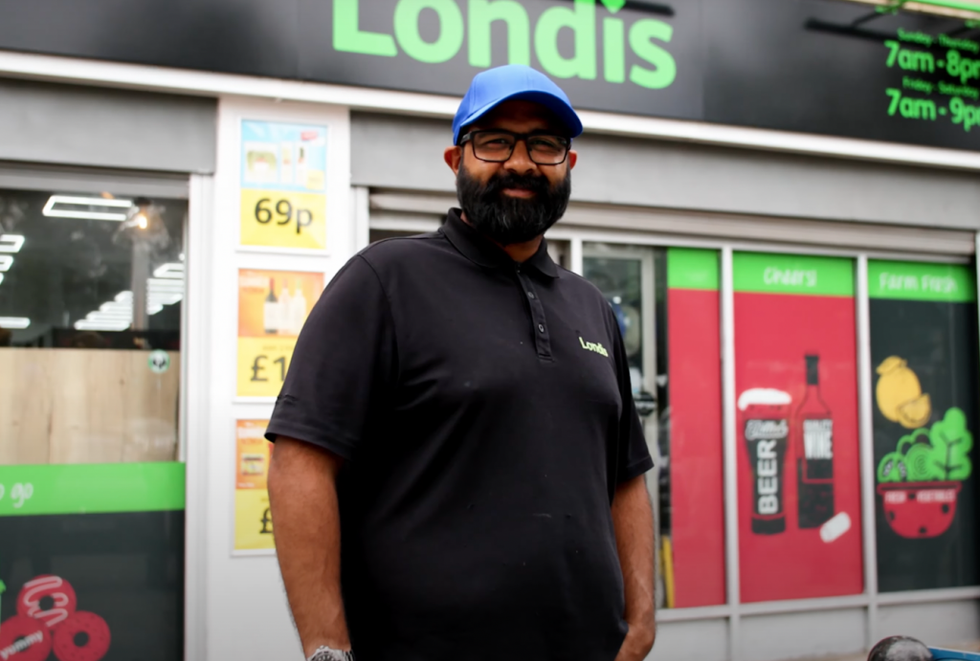C-stores have been thrust into the centre of the debate over performing as community guardians, and have stepped up security for staff as well as care for customers
Convenience stores have found themselves thrust into the spotlight – first by the pandemic, with communities relying on them more than ever as hubs for supplies and services, and now by the economic crisis and inflation, which has seen c-stores once again become lifelines as shoppers seek to stay closer to home, shopping little and often to save money.
This reliance carried with it a burden of responsibility for the storeowners, who strive to serve both customer and community in the best way they can.
At the same time, the crisis of youth access to vapes is ongoing, and the issue of retail crime and abuse of staff is reaching crisis point – raising questions of responsibility of retailers not only towards shoppers but to colleagues as well.
In fact, at this year’s Asian Trader Awards, entries in the Responsible Retailer of the Year category have shown how important is this issue of staff safety for retailers, as each of them listed the measures they have taken in this area. The winner in the category, Dave Hiscutt, who manages four Londis stores and one Morrisons Daily of the Bassett group, stood out with the results he achieved.
The group has heavily invested in new ways to combat antisocial behaviour (ASB) such as signing up to Facewatch, a facial recognition security system that sends alerts to authorised staff when a subject of interest enters a business.
Tech to be safe
Within just one week of implementing the Facewatch system, there was a significant decrease in crime. They have now rolled FaceWatch into three of their sites after the successful trial in the Westham Road, Weymouth store.
During the trial, they noted 40 alerts and 44 incidents in June, 36 alerts and 17 incidents in July and 45 alerts and 18 incidents in August.
Their alerts are still high, and will naturally peak as the watchlist lengthens, but these alerts aren’t necessarily converting into incidents, as potential offenders have learned not to target the store at all, Hiscutt notes.

He says confronting known thieves/troublemakers as they enter the store makes a big difference, instead of challenging them within, as they would possibly be aggressive then, often resulting in dangerous situations.
They have now started reviewing previous CCTV footage to identify any thefts that went unnoticed initially, and adding them to the Facewatch database, and Hiscutt thinks this proactive approach will not only protect the business and the team but also save them a substantial amount of money in the long run by minimising stock losses.
They have also installed StaffSafe security solution, which provides a live 24hr monitoring service, with five buttons installed behind the counter and in the office along with wristbands for all staff.
These buttons have various functions, and Hiscutt says the two most effective are the Audible Monitor and Silent Monitor. When pressed, the audible alert will cut out the radio playing in store, then start a siren noise, followed by a recorded announcement informing that the store is remotely monitored with the ability to dispatch police etc. There is a person on the other end who can see a live thread of their CCTV and hear everything being said in the store which they also record. The operator can talk over the PA system and interact with an offender, the purpose being to defuse situations: but they can also dispatch police and act in the interests of the team where necessary.
The silent alert which is the same alert for the wrist bands opens up the audio for the operator and CCTV link, but they remain silent unless spoken to by the store staff. Dave related how this was used during an armed robbery and proved particularly effective in getting police to the scene early.
The other three buttons cut out the radio and then play a pre-recorded message, one for shoplifting, one for ASB and one for manager to the till, the purpose being to help deter theft or ASB before an incident.
Besides these, they have invested in headsets in all sites for speedy communication between teams. This allows covert communication if a situation is developing and they can't speak freely.
Hiscutt says it dramatically increases efficiency as managers/team leaders and colleagues can ask questions and offer advice instantly.
Action plan
In recent months, ministers and government officials have spoken about getting tough on repeat offenders targeting retailers, with a particular focus on shop theft and abuse of retailers and their colleagues. The Retail Crime Action Plan, published by the National Police Chiefs Council on 23 October, set out a series of priorities for police forces and new ways to be able to identify offenders including facial recognition and artificial intelligence.
The publication of the plan followed a meeting between the policing minister Chris Philp and retail business leaders, with further details outlined about next steps in Operation Pegasus, including a new information sharing platform for retailers and police.

The Pegasus initiative is a business and policing partnership that will radically improve the way retailers are able to share intelligence with police, to better understand the tactics used by organised retail crime gangs and identify more offenders. This will include development of a new information sharing platform and training for retailers.
Spearheaded by Katy Bourne, the business crime lead for the Association of Police and Crime Commissioners, Pegasus is the first national partnership of its kind, and is backed by the Home Office, John Lewis, the Co-op, M&S, Boots, Primark and several more, who have collectively pledged to provide over £600,000 to get the initiative off the ground.
“Pegasus will be game changer in the fight against retail crime providing for the first time an accurate national picture of the organised groups from local families to cross border criminals driving organised shop theft. Retailers will agree ways to capture information that can be shared and analysed to create intelligence packages for police forces to target and track perpetrators,” Katy Bourne has said.
While trade bodies have welcomed the initiative, some local store owners, like Benedict Selvaratnam of the Freshfields Market convenience store in Croydon, are skeptical about their position in this scheme.
Selvaratnam feels the police’s latest “high-tech solution” is not affordable for small retailers without a government grant or proper support.
“It seems that we won’t be able to afford such measures. As a result, a lot of these criminals and shoplifters will be driven into smaller independents that don’t have this facility. They will now turn to us and steal even more from us because it will be so much more difficult for these people to steal from the bigger stores,” he recently told Asian Trader.
Beware: generational ban ahead
On the other side, the government is threatening to pass an illiberal and drastic generational tobacco ban that would adversely impact the businesses of every independent store in the country and deprive consumers of their rights.
The King’s Speech last month confirmed the introduction of the Tobacco and Vapes Bill to introduce a generational ban on tobacco products and restrict the sale and marketing of vapes to younger people.
The legislation, which seeks to ensure that anyone born after 1 January 2009 will never be able to legally purchase cigarettes, will affect all retailers who sell tobacco products. It means that, by 2037, retailers will be expected to distinguish between 27 and 28-year-olds when deciding who to sell tobacco products.
Additional details on measures to be included in the bill, including potential restrictions on the display of, colours, flavours, and availability of vaping products, will depend on the outcome of a public consultation that is closed on 6 December.
Meanwhile, New Zealand’s new ruling coalition has just announced it will abandon its proposed generational tobacco ban, which provided the inspiration, the model, and not least the political cover for the projected UK one.
Retailers are worried about the impact of such a ban – New Zealand’s original proposal included the withdrawal of 90 per cent of tobacco licences from the nation’s convenience stores- on their business.
A recent survey of 1,000 retailers conducted by JTI has found that 86 per cent of convenience retailers believe the proposed ban will have a negative impact on their business.
Over two thirds (67 per cent) of the retailers surveyed said that the ban would likely lead to an increase in illicit tobacco activity, with 66 per cent also stating that they believe the government does not have the required funding or resource to police a generational ban.
The survey also found that 62 per cent of retailers believe that the generational ban will be costly to their business in terms of implementation, with 55 per cent saying it will make ID checks more complicated for their staff and 58 per cent stating it will impact staff training specifically around underage sales.
Atul Sodha, owner of Londis Harefield, Uxbridge, commented: “It’s difficult to see how this proposed tobacco ban would be properly enforced. It’s a deeply impractical law, which means at some point retailers will be expected to distinguish between 36 and 37-year-olds when deciding who to sell tobacco products to. An increase in ID checks will likely slow down transactions in-store which can lead to frustrated customers.”
Tobacco remains an important category to 73 per cent of convenience retailers when it comes to generating footfall in store. In fact, a quarter of stores said that 50 per cent or more of their total revenue is from customers who purchase tobacco and other non-tobacco related items in the same basket.
“The proposed tobacco ban will hit convenience retailers the hardest,” Paul Cheema, owner of Malcolm’s Convenience and Forecourt, Coventry, said.
“We know from recent reports, and our own experiences, that violence or abuse towards shopkeepers is on the rise, with ID checks or refusal of sale often a common cause of this. It’s fair to say that the proposed ban would highly likely exacerbate this issue and drive a further increase in threatening behaviour against retailers.”
Nishi Patel, owner of Londis Bexley Park, added: “We’re already battling a growing illicit tobacco problem across the country, and I have no doubt that this ban would simply hand more of the UK tobacco market into the hands of criminals. Smuggled tobacco already costs law-abiding retailers thousands of pounds as smokers switch to cheaper, un-taxed and un-regulated illegal products. The police and Trading Standards would need significant additional support to ensure both the ban is enforced and to keep a lid on illicit trade.”
Ian Howell, fiscal and regulatory affairs manager at JTI UK, adds that, with the cost-of-living increase biting, there’s a risk the illicit tobacco trade could gain further ground with retailers feeling the sting from cheap imports and counterfeit products.
“We continue to find illegal products sold in convenience stores across the UK, often alongside the authentic versions. On top of this, we are seeing more online ‘shopfronts’, from social media marketplaces to auction sites and hurriedly registered domains selling illicit items,” he says.
Legislation introduced last year provides HMRC officers with powers to apply ‘on-the-spot’ fines of up to £10,000 against those dealing in illegal tobacco products and to revoke the registrations required under tobacco track and trace legislation.
“Sales of illegal tobacco products can result in the suspension or revocation of a premises license, fines, and prison sentences. In short, it could mean the loss of a business, financial ruin, and loss of liberty,” Howell notes.
“Illegal tobacco is not a victimless crime - it not only takes footfall and revenue away from legitimate convenience stores, but it also facilitates the supply of illegal tobacco to communities and supports organised criminal networks.”
Environmental footprint
Retailers and brands are embracing sustainable practices to minimise their environmental footprint. From implementing energy-efficient technologies in-store to reducing single-use plastics, retailers are taking significant steps to contribute to a greener future. Many brands have adopted sustainable packaging, prioritising materials that are recyclable, compostable, or biodegradable. Additionally, initiatives to reduce food waste through donations to local charities and innovative inventory management systems are becoming commonplace.
Tim Heathorn, wholesale convenience and gas sector manager at JTI UK, says that sustainability is key for JTI.

“It’s vital that manufacturers work hard to protect our planet's natural resources. This is why we have been investing for more than 15 years in reducing the carbon emissions from our operations. In 2022, we committed to be Carbon Neutral for our own operations by 2030 and aim to achieve Net-Zero Greenhouse Gas emissions across our entire value chain by 2050,” he explains.
“In addition to reducing emissions, we are addressing our broader impact on nature, including water consumption and waste reduction, forest conservation and biodiversity. We have also placed our 50,000+ vertically integrated growers at the centre of our leaf supply chain work, delivering positive impacts on their livelihoods through good agricultural practices, crop diversification and child education programmes.”
JTI has been reporting on sustainability since 2013 in line with global reporting standards and have earned several external recognitions along the way, such as being recognised on CDP’s “Climate Change A List” for the fourth consecutive year in 2022.
In 2022, 82 per cent of its packaging was reusable or recyclable and was comprised of 18 per cent recycled materials. The company’s target is 85 per cent reusable or recyclable packaging by 2025, rising to 100 per cent by 2030, with recycled materials accounting for 20 per cent of our packaging by 2025.
In 2021, JTI commenced the roll out of plug-in, hybrid cars for its team of UK wide Business Advisers, who visit key accounts, wholesalers, and independent stores each day, offering free installation of at-home charging points.
“We’re proud that 97 per cent of our Business Adviser team now drive hybrid cars and by the end of 2023 this will be 100 per cent,” Heathorn adds.
Waste and sustainability
Recycling practices have become a focal point for retailers, especially as campaigners push for an interoperable deposit return scheme (DRS) for drinks containers. Research by Keep Britain Tidy has shown that more than 70 per cent of litter is the result of drinks consumption with around 20 million drink containers littered, incinerated or ending up in landfill daily.
In October, the charity, along with manufacturers, retailers and environmental organisations, wrote to prime minister Rishi Sunak urging him to work with other parties and press ahead with DRS.
Following recent reports about the costs of DRS and calls to abandon it, a cohort – including major soft drinks producers Coca-Cola, PepsiCo and Suntory, the British Soft Drinks Association, environmental organisations and the Federation of Independent Retailers – voiced support for the government’s commitment to DRS, reiterating it should be aligned across all nations in terms of deposit levels, timeline, scope and fees.
“We know from evidence around the world that deposit return schemes can have a transformative effect on behaviour – reducing littering and increasing recycling, helping to deliver a circular economy for drinks containers,” Matt Gouldsmith, channel director, wholesale at Suntory Beverage & Food GB&I, told Asian Trader.
He noted that the delay of the Scottish scheme means we have an opportunity to better ensure the schemes introduced across the UK work for governments, manufacturers, retailers and consumers alike.
“We have always argued that there should be one DRS scheme covering the whole of the UK, but if not then success rests on all the separate schemes being fully aligned and interoperable. We have been working with the UK government and the devolved administrations on the development of their respective schemes and will continue to work to help ensure they progress as planned,” he said.
Consumer research commissioned by SBF GB&I, consulting over 8,000 UK shoppers, showed that DRS will close the gap between the intent of consumers to behave more sustainably and them committing to action.
Significantly, one of the most important findings from the research is that it will take just seven weeks for most shoppers to rethink their relationship with plastic bottles and to appreciate their value after living with the scheme.
“Not only is this an excellent indicator for the future success of the schemes, but it also acts as a firm reassurance to retailers on why their businesses should embrace deposit return schemes and how to do it. By working together, we can all play our part across the industry in securing a better future for generations to come,” Gouldsmith said.
Nurturing Communities
Responsible retailing extends beyond products to community engagement. Convenience stores are increasingly becoming community hubs, organising events and supporting local charities. This shift not only strengthens the retailer’s bond with its customers but also contributes to the overall well-being of the community.
SBF GB&I recently partnered with several independent convenience retailers across the country to help them donate stock to local charities and community groups.
The campaign followed the first successful partnership in December 2020, when 40 leading retailers were able to donate cases of SBF GB&I stock to causes close to their hearts.
This year saw 50 retailers across England, Scotland and Wales donating more than 90 pallets of Ribena, Ribena Sparkling and Orangina – equivalent to around 9,000 cases of stock – to a variety of community projects.

Natalie Lightfoot, of Londis Solo Convenience in Glasgow, said the initiative was a superb way to give something back to her local community.
“We know times are hard for shoppers right now, and charitable organisations are having to work even harder than ever. We’ve been a collection point for our local food bank for a number of years now, so we’ve seen the real positive impact that initiatives like this can deliver,” she said.
“This partnership with SBF GB&I will further help out our local charity partners, and the people who are most important to our store – the people in our local area”.
Wholesale partners Parfetts, United Wholesale Scotland and Splendour Wholesale, along with Amrit Singh of H & Jodie’s Nisa in Walsall, also took part and acted as distribution and collection points for retailers.
“The charity partnership is true to a key SBF GB&I value ‘Growing For Good’ which holds that the more they grow, the greater their ability to give back to society across consumers, customers and communities,” Gouldsmith commented.
The company has an ongoing partnership with FareShare, a charity aimed at tackling hunger and reducing food waste in the UK. Last year saw the incredible milestone of three million drinks donated by SBF GB&I to FareShare.
Healthy retailing
The sustainability legislation involving packaging, HFSS and allergy labelling has added to the ole that independent retailers have shouldered, placing them at the centre of their localities in more ways than one.
A ban on promotional offers of high in fat, sugar and salt products in England will not come into effect until October 2025, after the government extended the original deadline for two years. New rules limiting the location of HFSS foods in stores have come into effect as planned in October 2022, and despite the delay in the promotional restrictions, retailers have an opportunity to help support the efforts to reduce obesity, as around a quarter of adults and around a fifth of children aged 10 to 11 are now obese.
Recently, the Food Foundation has called on retail and food service sectors to measure and report on three key metrics in order to establish healthy and sustainable business portfolios and to help shift consumption patterns for the good of our health, as well as the planet’s.
The non-profit wants food businesses to report the percentage of sales of HFSS foods, fruit and vegetables and types of protein (animal and plant).
The call came as its State of the Nation’s Food Industry 2023 report has found that no major UK food retail or food service business has a target for or discloses the percentage of sales coming from both animal and plant proteins, despite making pledges to reduce carbon emissions.
The report also found that 21.5 per cent of multibuy deals are currently on meat and dairy foods, whereas just 4.5 per cent of multibuy deals are on fruit and vegetables and 4.2 per cent on staple carbohydrates.
Though some businesses are now reporting on the sales of HFSS foods and the sales of fruit and vegetables, not one of the 27 largest retailers and OOH sector companies assessed in the State of the Nation’s Food Industry report have a target for and disclose sales of both types of protein by source (animal and plant).
“Business transparency has stagnated, with fewer businesses disclosing sales weighted data on health and sustainability than last year. This negative trend is not being helped by the lack of leadership from government on food, and the fact there is still no agreed way of consistently measuring and reporting the nutrient content and carbon footprint of food,” Anna Taylor, executive director, The Food Foundation said.
“Government needs to build business confidence and signal its commitment to the healthy and sustainable diet agenda by making reporting of sales weighted data mandatory,” Taylor added.
By embracing responsible retailing practices, local stores are not only meeting the changing expectations of consumers but are also playing a vital role in building sustainable and thriving communities. As responsible retailing becomes the norm rather than the exception, it is evident that the convenience retail sector is paving the way for a more ethical and sustainable future.
Published in Asian Trader Vol. 35, No. 935, 15th December 2023 to 25th January 2024






